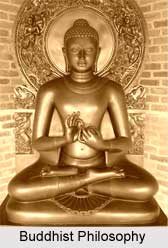 Buddhist philosophy describes that Khandas are the elements of conscious existence of which there are five constituents.
Buddhist philosophy describes that Khandas are the elements of conscious existence of which there are five constituents.
The first Khanda is the organized body, or the whole of being apart from mental processes. Next four Khandas are the sensation, perception, discrimination and consciousness.
The last four Khandas are consequences or properties of the first khanda. This must be understood as including the soul as well as the body. The Buddhists philosophy considers that at the time of death the five Khandas entirely vanish. Gautama Buddha says that none of the Khandas, taken separately, are the Ego; and that taken conjointly they are not the Ego. However there is no such thing as an Ego apart from the five Khandas.
This article is a stub. You can enrich by adding more information to it. Send your Write Up to content@indianetzone.com



















